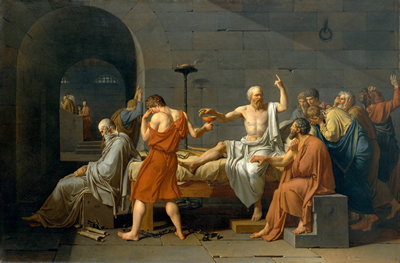Chapter 5: Concerning the Way to Govern Cities or Principalities which Lived Under Their Own Laws Before They Were Annexed
Whenever those states which have been acquired as stated have been accustomed to live under their own laws and in freedom, there are three courses for those who wish to hold them: the first is to ruin them, the next is to reside there in person, the third is to permit them to live under their own laws, drawing a tribute, and establishing within it an oligarchy which will keep it friendly to you. Because such a government, being created by the prince, knows that it cannot stand without his friendship and interest, and does it utmost to support him; and therefore he who would keep a city accustomed to freedom will hold it more easily by the means of its own citizens than in any other way.
There are, for example, the Spartans and the Romans. The Spartans held Athens and Thebes, establishing there an oligarchy, nevertheless they lost them. The Romans, in order to hold Capua, Carthage, and Numantia, dismantled them, and did not lose them. They wished to hold Greece as the Spartans held it, making it free and permitting its laws, and did not succeed. So to hold it they were compelled to dismantle many cities in the country, for in truth there is no safe way to retain them otherwise than by ruining them. And he who becomes master of a city accustomed to freedom and does not destroy it, may expect to be destroyed by it, for in rebellion it has always the watchword of liberty and its ancient privileges as a rallying point, which neither time nor benefits will ever cause it to forget. And whatever you may do or provide against, they never forget that name or their privileges unless they are disunited or dispersed, but at every chance they immediately rally to them, as Pisa after the hundred years she had been held in bondage by the Florentines.
But when cities or countries are accustomed to live under a prince, and his family is exterminated, they, being on the one hand accustomed to obey and on the other hand not having the old prince, cannot agree in making one from amongst themselves, and they do not know how to govern themselves. For this reason they are very slow to take up arms, and a prince can gain them to himself and secure them much more easily. But in republics there is more vitality, greater hatred, and more desire for vengeance, which will never permit them to allow the memory of their former liberty to rest; so that the safest way is to destroy them or to reside there.

Holding formerly independent territory
In the previous chapter Machiavelli told us that a centrally administered state is difficult to conquer but easy to hold, in part, because the citizens are accustomed to obedience. Here he makes the corollary point that a state that is unaccustomed to obedience, because it has its own independent political traditions, is nearly impossible to hold.
The Peloponnesian War (431–404 BCE) in which Sparta finally defeated Athens provides a good example of the difficulty of holding a self-governing state. Athens is a worst-case example of self-government, because it was the world’s prototype democracy. The conflict was a protracted war of attrition that resisted peace settlements, and proved devastating to both sides. In the end Sparta defeated Athens and installed a puppet oligarchy, known as the "Thirty Tyrants." However, the following year the Athenians expelled the oligarchs and restored the city’s ancient democracy. The war was so exhausting even to the winner, that by 371 BCE, Thebes defeated Sparta at the Battle of Leuctra.
Machiavelli’s examples from Roman history are from the Punic wars in which Rome fought and won three wars with the city state of Carthage in modern Tunisia. Both states were republics that were, as Machiavelli said, “…accustomed to live under their own laws and in freedom.”
The first two were long, bloody, exhausting wars of attrition. In the first war, the powers clashed over dominance of Sicily. Rome won a decisive victory but Carthage, revived. In the second war Carthage, illustrated Machiavelli’s point that “in republics there is more vitality, greater hatred, and more desire for vengeance.” The famous Carthaginian general Hannibal, brought an army through Spain, over the Alps and attacked Roman Italy.
In the third Punic War, 149–146 BC, the Roman General Scipio Aemilianus Africanus attacked the city. Even though Carthage was no immediate threat to the Roman Empire, the city was completely destroyed and all its inhabitants killed or enslaved.
The defeat of Capua was an incident in the Second Punic war, in which the city was an ally of Hannibal. Rome besieged the city and refused to lift the siege even when Hannibal launched an attack that threatened Rome itself.
In 133 BCE, General Scipio Aemilianus Africanus also completely destroyed the city of Numantia in north central Spain. Numantia is a particularly good example of Machiavelli’s point because most of its inhabitants committed suicide rather than capitulate.